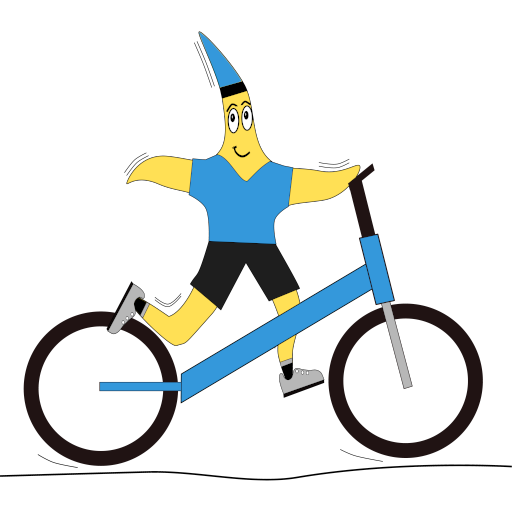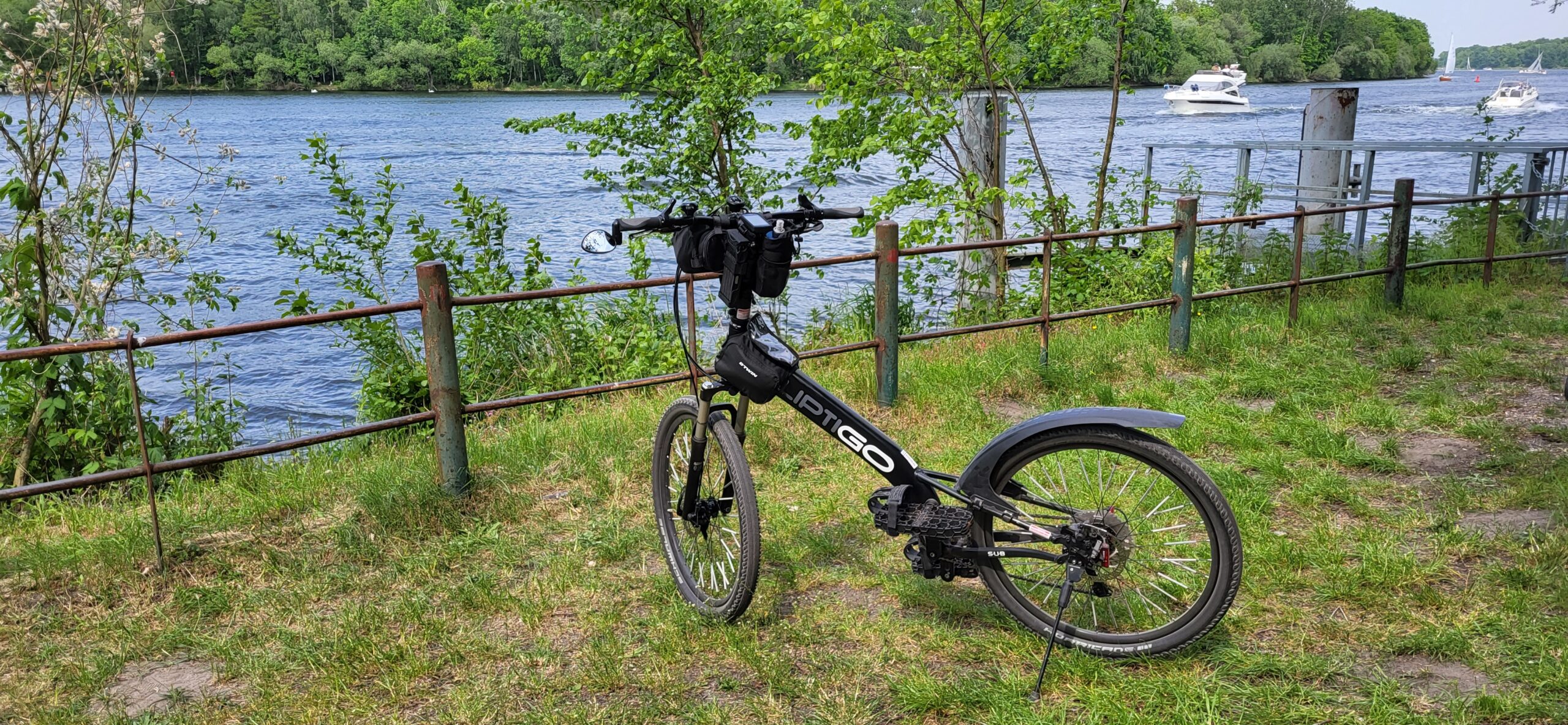Zuletzt aktualisiert | last modified: 26. April 2025
Startseite | English | The ElliptiGO MSUB

Inhalt | Content
Short description
The ElliptiGO MSUB is the mountain bike version (M) of the stand up bike (SUB). Main differences to the current road version called RSUB (R=Road) are: suspension instead of a rigid fork, wider 27.5 inch tires and ten (Shimano Deore) instead of eight gears (Shimano Altus). The frame of RSUB and MSUB is identical.
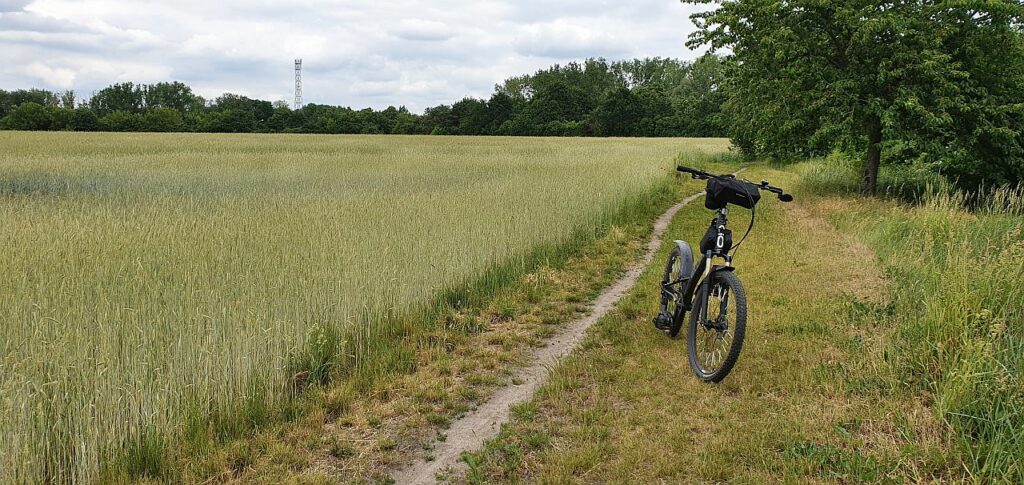
Technical data
Stand up bikes – manufacturer/ importer information (deviations possible)…
| Stand Up Bikes | SUB | RSUB | MSUB |
|---|---|---|---|
| Wheelbase | 46.6” (118cm) | 46.5″ (118 cm) | 47.2” (120 cm) |
| Total Length | 66” (168cm) | 74.4″ (189 cm) | 74.8” (190 cm) |
| Weight | 28.8 lbs (13.0 kg) | 31.4 lbs (14.2 kg) | 34.6 lbs (15.7 kg) |
| Operating Height | 48.5-54.5” (123-138cm) | 43.3-49.6″ (110-126 cm) | 45.3-51.6” (115-131 cm) |
| Storing Height (with front wheel) | 45.5” (116 cm) with steering extender | 43.3″ (110 cm) with steering extender | 45.3” (115 cm) with steering extender |
| Storing Height (no front wheel) | 24.5” (62 cm) without steering extender | 22.5” (57 cm) without steering extender | 24.5” (62 cm) without steering extender |
| Crank Length | 5.9” (150 mm) | 5.9” (150 mm) | 5.9” (150 mm) |
| Gears/Speeds | 8 | 8 | 10 |
| Gear Ratio Range | 1,8 – 5,4 | 1,4 – 4,4 | 0,93 – 3,5 |
| Avg Gear Step | 18 % | 18 % | 16 % |
| Total Gear Range | 309 % | 309 % | 382 % |
| Gear Inch Range | 34 – 105 | 39 – 121 | 26 – 99 |
| Stride Length | 11.8” (30 cm) | 11.8” (30 cm) | 11.8” (30 cm) |
| Front and Rear Brakes | Linear pull rim brakes | Mechanical disc brakes | Mechanical disc brakes |
| Grips | Clamp on anti-rotation, with ergonomic shelf | Clamp on anti-rotation, with ergonomic shelf | Clamp on anti-rotation, with ergonomic shelf |
| Cranks | Custom forged aluminum | Custom forged aluminum | Custom forged aluminum |
| Frame | 6061-T6 aluminum | 6061-T6 aluminum | 6061-T6 aluminum |
| Fork | 20″ butted chro-moly with 1.5″ steerer | 700C butted chro-moly with 1.5” steerer | Air suspension fork, 100mm travel, variable damping |
| Brake Levers | Two finger levers | Two finger levers | Two finger levers |
| Propulsion System | Circular drive | Circular drive | Circular drive |
| Pedals | Composite nylon pedal | Composite nylon pedal | Composite nylon pedal |
| Chainring | 60-tooth, 130 BCD, 6061-T6 aluminum | 48-tooth, 130 BCD, 6061-T6 aluminum | 42-tooth narrow/wide 130 BCD 7075-T6 aluminum |
| Cassette | Shimano 8-speed 11-34 tooth range | Shimano 8-speed 11-34 tooth range | Shimano 10-speed 11-42 tooth range |
| Bottom Bracket | ISIS spline, sealed bearings | Oversized M48, ISIS spline, sealed bearings | Oversized M48, ISIS spline, sealed bearings |
| Steering Column/ Extender | Adjustable height index locking, Chro-moly steel, anti-rotation indexing | Adjustable height index locking, Chro-moly steel, anti-rotation indexing | Adjustable height index locking, Chro-moly steel, anti-rotation indexing |
| Kickstand | Single leg, forged aluminum kickstand | Single leg, forged aluminum kickstand | Single leg, forged aluminum kickstand |
| Headset | 1.5” threadless | 1.5” threadless | 1.5” threadless |
| Tires | Kenda Kwest, 20″ x 1.5″ 60 TPI, 100-psi | Kenda Kwest, 700 x 40C 60 TPI, 85-psi | Kenda Honey Badger, 27.5” x 2.2” 60 TPI, 50-psi |
| Stem | Forged aluminum, 31.8 mm dia bar, 80 mm x 7 deg | Forged aluminum, 31.8 mm dia bar, 80 mm x 7 deg | Forged aluminum, 31.8 mm dia bar, 80 mm x 7 deg |
| Handlebar | Aluminum. MTB riser bar, 50mm x 670mm | Aluminum MTB flat bar, 31.8 mm dia x 720 mm wide | Aluminum MTB flat bar, 31.8 mm dia x 720 mm wide |
| Shifter | Shimano 8-speed trigger | Shimano 8-speed trigger | Shimano 10-speed trigger |
| Front Wheel | 20″ aluminum aero profile rim, 28-spoke | Schrader, 700C aluminum, 32-spoke | Schrader, 27.5” aluminum, tubeless ready, 32-spoke |
| Rear Wheel | 20″ aluminum aero profile rim, 32-spoke | Schrader, 700C aluminum, 32-spoke | Schrader, 27.5” aluminum, tubeless ready, 32-spoke |
| Climbing Activity | Climb steep hills up to 20-30% grade | Climb steep hills up to 20% grade | Climb steep hills up to 20-30% grade |
| Recommended Riding Terrain | Road, flat and hilly terrain | Road, flat and hilly terrain | Off road, road, flat and hilly |
| Workout Resistance Selection | 8 different levels of resistance. 309% total resistance range. 18% difference between levels | 8 different levels of resistance. 309% total resistance range. 18% difference between levels | 10 different levels of resistance. 382% total resistance range. 16% difference between levels |
Tables for gear ratios and speed can be found in the German version of this article.
The wheels of the RSUB fit on the MSUB. If the RSUB 8-speed cassette is swapped for the Shimano CS-M4100 10-speed cassette of the MSUB, the MSUB gearshift also work perfectly with the RSUB wheels. Because the circumference of the two wheels is almost the same, such a conversion in practice would only have an impact via the rolling resistance.
Summary
In summary, the ElliptiGO MSUB is the most versatile and off-road capable of my three bikes. You can go anywhere without have to worry about route planning. Shortcuts cross-country can be taken spontaneously. While having a lot of fun – you achieve a very good overall sporting benefit. As long as you don’t spend most of your time on solid surface, want to ride quickly on flat terrain or downhill frequently or want to save the extra costs, I would always prefer the MSUB to the RSUB, even if the maintenance effort is higher.

However, it should be taken into account that the joint load on all stand up bikes is noticeably higher than on elliptical bikes. If this is an absolute priority, you might want to choose a 3C, 8C or 11R.
Operation and practice
I operated my MSBU in the city for the first 4000 kilometers. In order to get to somewhat hilly terrain, I had to „travel“ about 10 kilometers there. Since the bike paths there are often in a more robust condition and there are many streets and paths with cobblestones or unpaved surfaces, I decided to buy the MSUB.
In the city I rode distances of up to 60 kilometers and often on varying terrain. Lots of asphalt, but also long distances on cobblestones or unpaved sand, gravel and forest paths.
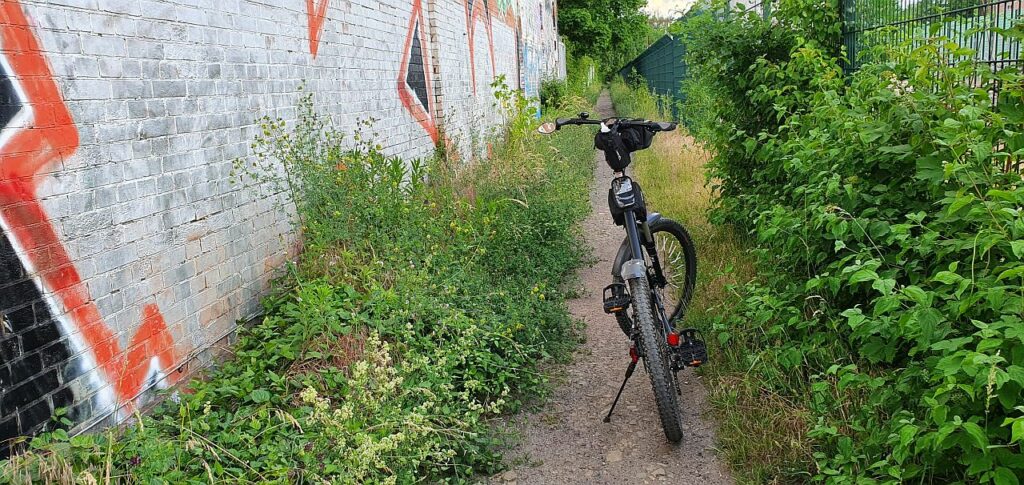
Now I ride the MSUB in hilly terrain, where it is even more fun and is ideal with its 10-speed gearshift. But, the distance per training session has become a little less.
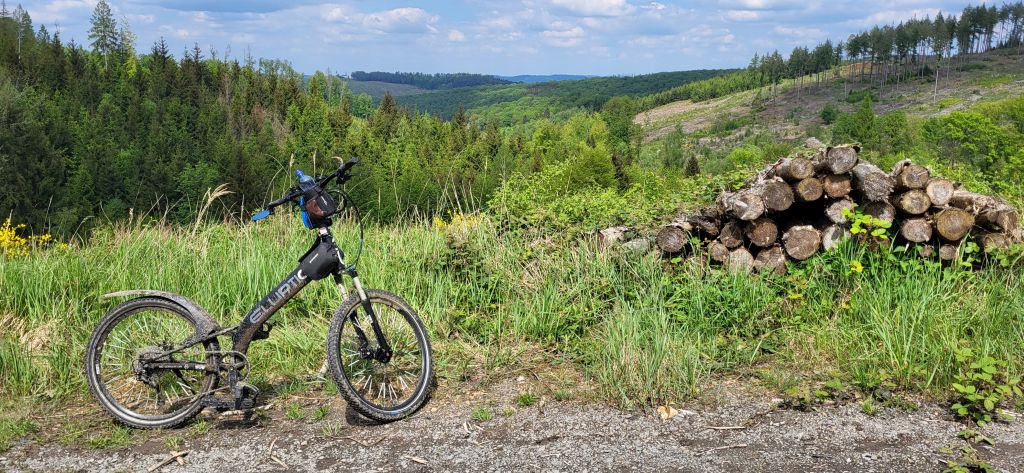
Terrain
In my first urban environment were no real mountains, but there was some profiled terrain in which I had a lot of fun with the ElliptiGO MSUB and was able to challenge my personnel fitness.
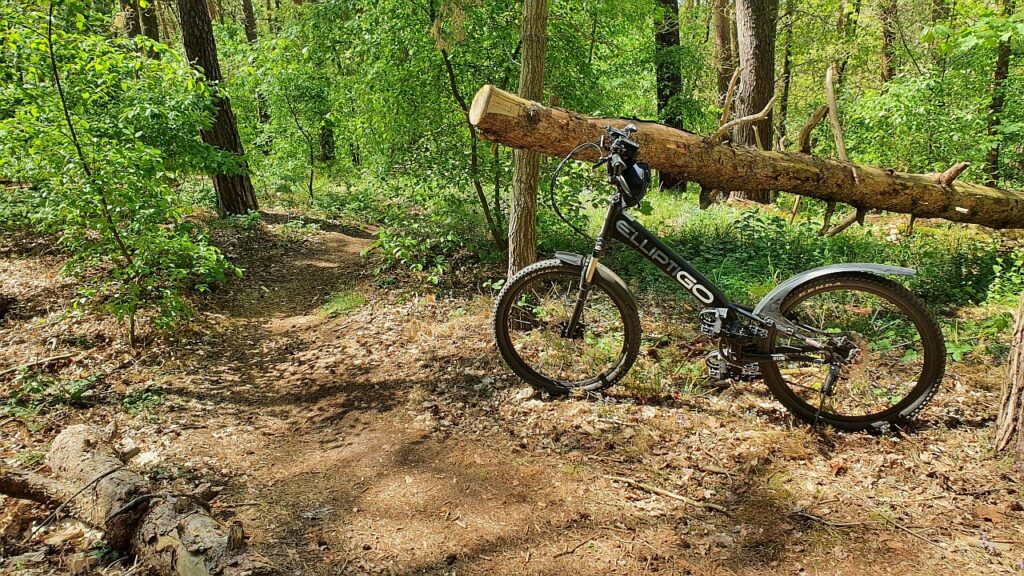
But the MSUB can also to be used very well in a steeper environment.
Since the MSUB is a hardtail bike and the fork manufacturer (more on that below) recommends the suspension fork series more for trekking/ cross country/ trail than for all mountain/ freeride/ downhill, the off-road suitability has its limits at some point. I personally would not put too much strain on the MSUB frame and avoid long jumps with hard landings (refer about this to the article indoor workout).
Gearshift
I find the gear ratios of the 10-speed shift ideal. In fast passages, the MSUB can be driven on the two smaller sprockets on a straight line at over 30 km/h if your legs allow it.
Climbs of more than 25% are easy to handle with the gearshift, even in rough terrain.
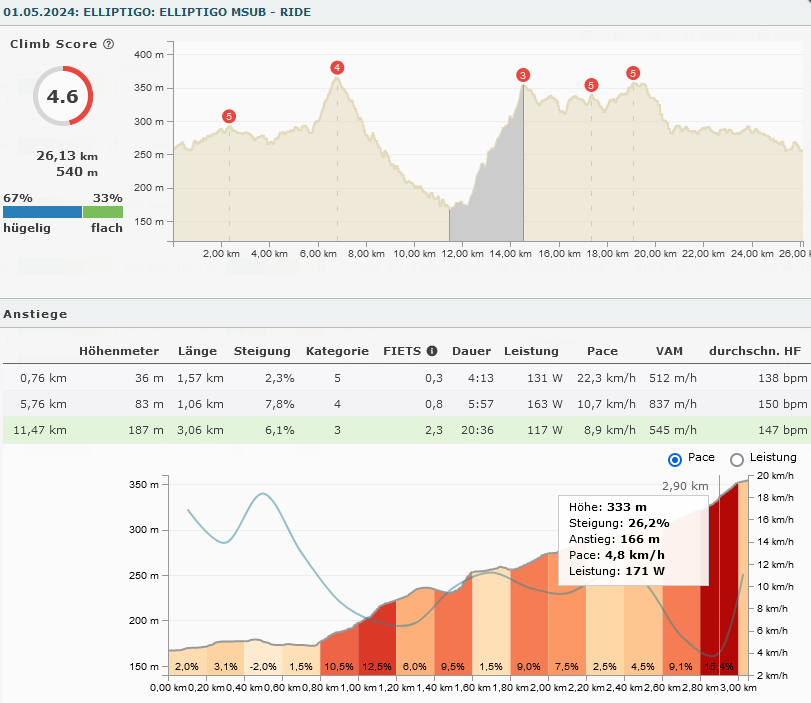
With the available gear ratios, you can move the bike very slowly and safely, even on difficult terrain.
Tires
I rode about a thousand kilometers with the standard Kenda Honey Badger Sport tires. They are not bad and have good grip, especially on sand and gravel, but they were too rough for my terrain. That’s why I initially switched to Schwalbe Hurricane Performance Addix in the same size (ETRTO 57-584 | 27.5×2.25″). These roll very quietly and quickly on asphalt and still have sufficient grip on light terrain, except on loose dry sand. But they have no puncture protection. Once I was hit by splinters of glass on both tires at the same time…

After two more breakdowns in the city due to broken glass, I had enough of the Hurricane. Since this size is not available with better puncture protection, I don’t want a narrower tire and one with a width of 2.40″ doesn’t fit in the frame, I have now replaced it with „unpuncturable“ Schwalbe Marathon Plus MTB.
With several thousand kilometers of practice, I can say that I really like these tires. They roll pretty well, as expected not quite as light as the Hurricane, but much better than the Kenda and are definitely suitable for asphalt. On fine gravel, they are much better than the Hurricane, but not really great on loose, dry sand or gross gravel either. They have already received a number of pieces of glass without causing a flat tire.
I can highly recommend the tires for the MSUB, especially on varying surfaces with a higher asphalt share or at higher glass risk. However, I probably wouldn’t use them for mostly off-road driving anymore.
I am currently using AV21 tubes from Schwalbe. These have Schrader valves, like the fork. Therefore, a fork pump is sufficient in the puncture kit, even if you have to pump the tires a little longer.
Maintenance and wear
As a model comparable to normal bicycles, maintenance and wear of the components are relatively similar.
There is list of torques and a list of maintenance schedule in the operating instructions.
Stand up bikes – torques (manufacturer/importer)…
| Description | Fastener | Tool | Quantity | Torque (NM) |
|---|---|---|---|---|
| Grips to Handlebars | M4x0.70 | 3 mm Allen | 2 | 2-3 |
| Gear Shifter to Handlebars (SUB/RSUB) | M6x1.0 | 5 mm Allen | 1 | 5-7 |
| Gear Shifter to Handlebars (MSUB) | M5x0.8 | 4 mm Allen | 1 | 3-5 |
| Brake Levers to Handlebars | M5x0.8 | 4 mm Allen | 2 | 4-5 |
| Stem to Handlebars | M5x0.8 | 4 mm Allen | 4 | 4-5 |
| Steeering Extender Star Nut | M6x1.0 | 5 mm Allen | 1 | 6-8 |
| Stem to Steering Extender (SUB) | M6x1.0 | 5 mm Allen | 2 | 8-10 |
| Stem to Steering Extender (MSUB/RSUB) | M5x0.8 | 4 mm Allen | 2 | 5-6 |
| Steering Column Base to Fork Steering Tube | M6x1.0 | 5 mm Allen | 2 | 6-8 |
| Kickstand to Frame | M6x1.0 | 4 mm Allen | 2 | 6-8 |
| Rear Brakes to Frame (SUB) | M6x1.0 | 5 mm Allen | 2 | 5-7 |
| Rear Brakes to Frame (MSUB/RSUB) | M6x1.0 | 5 mm Allen | 2 | 6-8 |
| Front Brakes to Fork (SUB) | M6x1.0 | 5 mm Allen | 2 | 5-7 |
| Front Brakes to Fork (MSUB/RSUB) | M6x1.0 | 5 mm Allen | 2 | 6-8 |
| Brake Pads to Brake Arms (SUB) | M6x1.0 | 5 mm Allen | 4 | 6-8 |
| Brake Cable to Brake Arms (Cable Anchor Bolt) | M6x1.0 | 5 mm Allen | 2 | 6-8 |
| Brake Rotor Bolts (MSUB/RSUB) | M5x0.8 | Torx t25 | 12 | 2-4 |
| Bottom Bracket to Frame | 1.375”-24 | BB Tool | 2 | 50-70 |
| RH/LH Crank to Bottom Bracket | M15x1 | 8 mm Allen | 2 | 35-45 |
| Chainring/Chain guard to RH Crank | M8x0.75 | 5 mm Allen | 5 | 8-10 |
| Chain Keeper Bracket to Frame (SUB) | M6x1.0 | 4 mm Allen | 1 | 6-8 |
| Chain Keeper to Chain Keeper Bracket (SUB) | M5x.8.0 | 3 mm Allen | 1 | 4-5 |
| Pedal to Crank Arm | 9/16”-20 RH | 6 mm Allen | 2 | 34 |
| Pedal Axle Retention Screw | M6x1.0 | 4 mm Allen | 2 | 6 |
| Cassette Lock Ring | – | Shimano Lock Ring Tool | 1 | 30-50 |
| Shifter Cable Inner Cable Fixing Bolt | M6x1.0 | 5 mm Allen | 1 | 6-8 |
| Deraileur Hanger to Frame | M4x0.70 | 3 mm Allen | 2 | 2-3 |
| Deraileur to Hanger | M10x1.0 | 5 mm Allen | 1 | 8-10 |
Stand up bikes – maintenance specifications (manufacturer/importer)…
| Stand Up Bikes | Every Ride | Every Week | 30 Days | 6 Mon | 12 Mon | 18 Mon | 24 Mon |
|---|---|---|---|---|---|---|---|
| Inflate Tires | |||||||
| Inflate Fork (MSUB) | |||||||
| Lube Chain | |||||||
| Pedal Outer Dust Cap (x2) | |||||||
| Pedal Washer Not Bent (x2) | |||||||
| Professional Tune-Up | |||||||
| Replace Brake Pads (MSUB/RSUB) | |||||||
| Replace Brake Pads (SUB) | |||||||
| Replace Brake Rotor (MSUB/RSUB) | |||||||
| Replace Shifter and Brake Cable | |||||||
| Replace Cable Housing | |||||||
| Replace Tires | |||||||
| Replace Chainring and Cassette | |||||||
| Replace Chain | |||||||
| Replace Rear Derailleur Jockey Wheels | |||||||
| Suspension Fork Service (MSUB) |
The maintenance intervals depend on the time and a defined usage environment. In my opinion, the replacement specifications for wearing parts should be critically examined for sustainability reasons. Replacement should take place when the parts are actually worn out. Safety-relevant components, such as brake cables and pads, require timely replacement. Due to the higher effort involved, it is advisable to regularly service the MSUB suspension fork before it loses air.
The manufacturer has a whole series of useful support videos to help with the work.
Since the MSUB does not have a seat post and the frame is comparatively wide, many classic bicycle repair stands with a clamp are not suitable. I use a stand where the front wheel is replaced by a holding axle for fixation. The length of the MSUB just fits my model and it is held stable. However, this kind of stand is not suitable for fork maintenance.
Chain/ Chainring
It’s a no-brainer that you should care for the chain and moving parts regularly. I do it every 200 to 300 kilometers, or more often if they are very dirty.
The chains are replaced if the 1mm side of a standard chain wear gauge just starts to fall through. On my MSUB, the first chain lasted 2200 kilometers, the second just under 2000 kilometers. As a replacement, I took a chain from the German ElliptiGO online shop. This is already supplied in the appropriate length of 114 chain links. It is a YBN chain that fits perfectly on the narrow-wide chainring of the MSUB. A two-piece master chain lock that can be opened and closed with any compatible chain pliers is included.
After switching from the city to hilly terrain, the same chain only lasted 1,000 kilometers before reaching the 1 mm limit. When my supply of MSUB chains runs out, I will probably try a KMC chain. I’ve had good experiences with this brand on the SUB so far.
My MSUB came with a 42 tooth BCD 130 mm chainring made of AL7075 aluminum on the five-arm crank. With narrow-wide technology, thicker teeth grip between the outer plates of the chain, which is intended to prevent it from falling off even without a chain keeper. This works well for me.
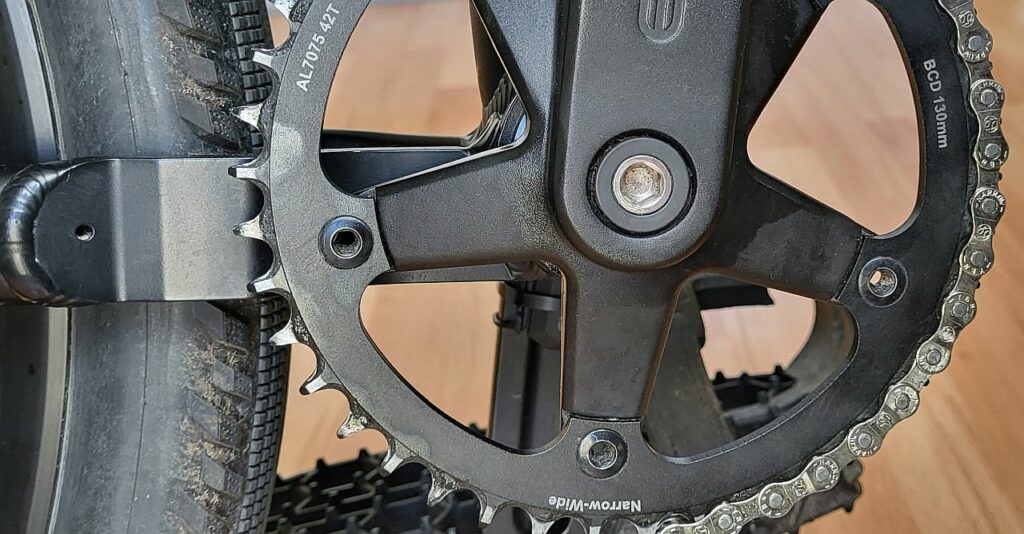
I read that there are MSUB with 38T and 44T chainrings. I couldn’t find out whether these are alternative standards or subsequent adaptation. When using the 38T version, a shorter chain with 110 instead of 114 links is necessary.
Gearshift/ Cassette
After changing the chain for the first time, I had problems with the gears of the Shimano Alfine RD-M6000 rear derailleur on the two smallest sprockets, which I couldn’t completely eliminate even by changing the settings. Finally, the second smallest 13T sprocket still wanted to jump to the next larger one when driving faster.
So I completely replaced the Shimano Deore CS-M4100 cassette after 2300 kilometers. The version with a maximum of 42 teeth (11-13-15-18-21-24-28-32-37-42T) is installed, which fixed part consists of the sprockets 15T to 42T. The two smallest sprockets 11T and 13T (bj/ bk/ bv) are loose and can be purchased individually.
A standard, Shimano-compatible lock ring tool is required to remove and install the cassette. How to do it is written in the Shimano manual.
Since changing the cassette and readjusting the derailleur, everything has been running optimally again and the cassette still works even after the second chain replacement without any problem. Instructions for setting the derailleur are published by the manufacturer .
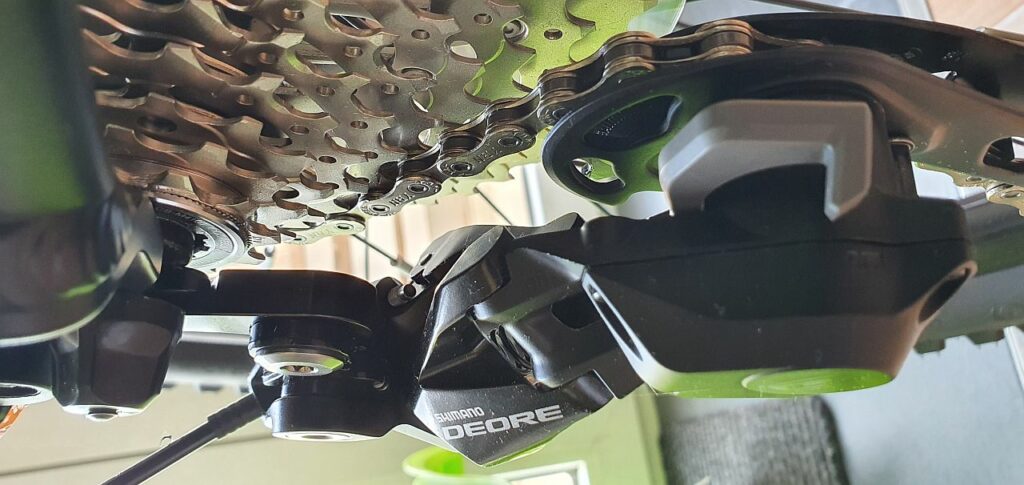
The derailleur is equipped with the Shimano Shadow Plus feature, which is intended to prevent the chain from hitting the chainstay in rough terrain (the gray lever in the „on“ position) and makes it easier to install and remove the rear wheel (the gray lever set to „off“).
I recently received a message from an MSUB rider whose derailleur hanger broke. She found out that it is a custom-made item specifically for the MSUB. Replacements are available, but only directly from ElliptiGO USA. As of January 2025, the cost is eight dollars, plus shipping and any import duties.
Brakes
In my opinion, the Tektro MD-M280 disc brakes are fine for the ElliptiGO MSUB, although they are mechanical and not hydraulic. They require very little maintenance.
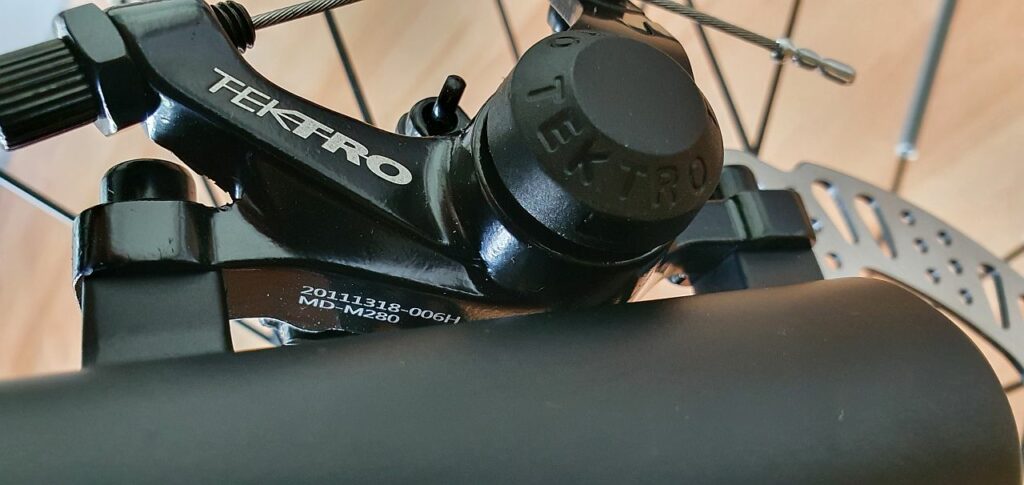
The thickness of the disc brake pads and the condition of the brake cables should be checked regularly. Otherwise, all you have to do is adjusting the brakes from time to time (see support video) and oil the cables a little.
I replaced the front and rear brake pads for the first time after about 5,000 kilometers. The rear ones were already quite worn, while the front ones could have been used even further. I replaced the original sintered Tektro pads with organic pads from Jagwire (Sport Organic). These break fine and don’t produce any noise. Both brake cables were also replaced at this time. The rear brake cable had two broken wires near the rear mounting bolt.
Suspension fork
After about 1000 kilometers, the adjuster for the compression of my suspension fork (blue lever on the top of the right fork leg) began to adjust itself. After a total of around 2000 kilometers the fork started to lose air. At first, I had to pump it every 80 to 100 kilometers, but a short time later it no longer held air at all.
It was recommended by the fork manufacturer Spinner to change the sealing rings on the screw connection of the left upper fork leg and those on the piston in order to get the fork to function again.
If one knows that it is a spinner fork, an operation manual can be found online. Spinner recommends a minor service (maintenance of the lower fork legs) after every 50 hours of riding or six months – whichever comes first – and a major service (complete maintenance of the fork) after 200 hours of riding or 12 months.
So I disassembled the fork, cleaned it, replaced all the sealing rings and re-greased/ oiled it. Since then, the fork has been working perfectly again.
The old X-ring for sealing the piston had two minimal vertical grooves, which were probably responsible for the air loss…
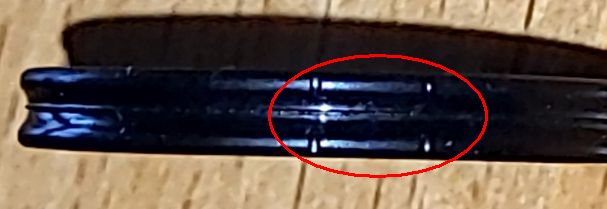
An O-ring under the adjustment screw for the compression was deformed, which caused the automatic adjustment…
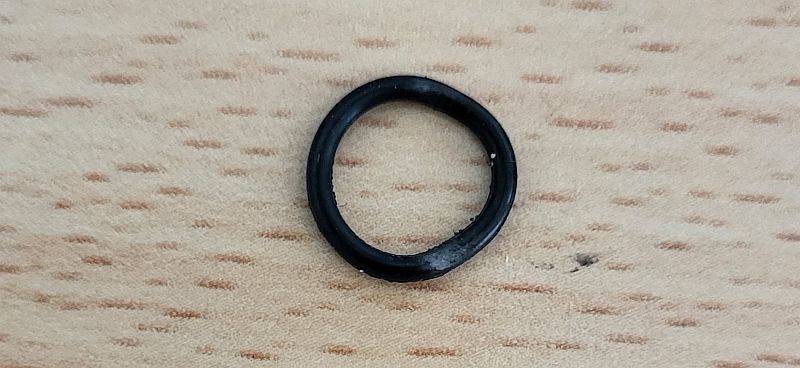
After about 1500 more kilometers it was already noticeable that the fork needed to be pumped slightly more often. I carried out the second major fork service after almost a year and a good 1800 kilometers of driving with the seals. The fork had held the air quite well until then.
A separate article describes the fork maintenance step by step.
Side stand
The standard side stand turned out to be not very durable. In fact, it has already broken off once. It also doesn’t impress with a good stability of the bike.
Side stands with a hole spacing of 15 millimeters, as required by the frame of the MSUB/ RSUB, are not so easy to obtain in the required length. Since I didn’t want to tinker, I used the original spare part from the German ElliptiGO online shop. If this stand breaks again, I’ll try a different model.
The same model with a shortened shaft is installed on the SUB. With this, I haven’t had any problems so far. It’s pretty stable here.
Startseite | English | The ElliptiGO MSUB
